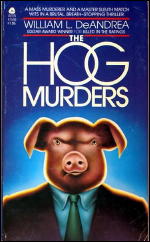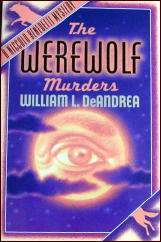Tue 22 Mar 2011
Reviewed by Bill Crider: WILLIAM L. DeANDREA – The Hog Murders.
Posted by Steve under Reviews[6] Comments
WILLIAM L. DeANDREA – The Hog Murders. Avon, paperback original, October 1979.

DeAndrea won an Edgar for his first novel (Killed in the Ratings) despite some dissenting opinion among mystery fans. (I liked it, but George Kelley hated it.) The Hog Murders seems a likely candidate for this year’s award for best paperback.
In a snowbound city in New York State, someone who signs his letters HOG takes credit for a series of apparently unrelated deaths. When the local police are unable to make any headway, a world famous detective, Professor Niccolo Benedetti, is called in.
He and his former student, Ron Gentry, now a private detective, team up with the police to investigate. Eventually, after following a number of false leads, they discover the solution to their problem.
There are several things wrong with The Hog Murders. For one thing, the investigators overlook some indicators that are so obvious readers might feel irritation with the detectives’ stupidity. Nevertheless, I liked the book. The relationship between Benedetti and Gentry is well done (Wolfe and Archie are the obvious models), and several of the other characters are interesting (notably police inspector Fleisher).
There are also a number of fair clues to HOG’s identity scattered here and, there. If this is the first book in a series, as it seems to be, DeAndrea may very well have found himself a successful formula.

Editorial Comments: As Bill predicted, The Hog Murders did indeed win an Edgar award, as the Best Paperback Original Mystery, 1980.
It took DeAndrea 13 years, however, to write two more books in the Niccolo Benedetti series: The Werewolf Murders (Doubleday, 1992) and The Manx Murders (Otto Penzler, 1994). Strangely enough neither of these two later books were reprinted in paperback.
As Bill related in this earlier post, as a judge for the first “Nero” Award, The Hog Murders was one of three books he considered as runners-up to his first choice, Lawrence Block’s The Burglar Who Liked to Quote Kipling.
March 22nd, 2011 at 3:02 pm
The cover of THE HOG MURDERS is one of the ugliest I can remember ever seeing. If I hadn’t known the author’s name at the time, I swear I’d never have bought it. I cringe every time I see it.
DeAndrea, who died young in 1996, was only 44 at the time. I don’t know how many people have won three Edgars, but he is one of them. The third was in 1994 for his massive reference work, Encyclopedia Mysteriosa, which I found both flawed, opinionated and greatly entertaining.
One wonders what he might have accomplished if he’d been given more time.
March 22nd, 2011 at 3:12 pm
I was and am a big fan of William L. DeAndrea too.
THE WEREWOLF MURDERS is a gem of fair play puzzle mystery fiction. The title is a bit misleading – it is definitely not any sort of supernatural tale. It’s a “real mystery”, and a good one.
I can’t stand that awful HOG MURDERS cover either (thought I was the only one!)
March 22nd, 2011 at 4:35 pm
I thought the ugliness of the cover was intentional.
It always made me think of ANIMAL FARM.
Sadly, since I am a big (maybe not “a seventh of a ton”) Nero Wolfe fan, I discarded this years ago without ever getting around to reading it. Money for rental space unfortunately requires periodic culling of my enormous collection of reading copies.
By the way, the Wolfe Pack site (see Mr Levine’s comment in Bill Crider’s earlier post) mention’s DeAndrea two Lobo Black western mysteries as having a Wolf/Goodwin-ish detecting influence.
I’ve ordered those used from Amazon.
March 22nd, 2011 at 10:08 pm
“…flawed, opinionated and greatly entertaining.”
That could be the definition of William DeAndrea. I can’t think of anyone who could annoy, entertain, and arouse my ire the way he did — even now rereading copies of his column ‘J’Accuse’ on TAD can be both frustrating and entertaining.
RE THE HOG MURDERS I couldn’t help but think that this was not an easy one to write and that the reason he did not follow up immediately was that he wanted a second book to be its equal — not something that easy to do.
Like DeAndrea himself the book is flawed, difficult, entertaining, and brilliant. It’s one of those books you read torn between applause and the desire to throw it across the room — which was one of DeAndrea’s gifts.
Whenever I read another bland mystery that doesn’t really challenge me either emotionally or intellectually I think of Bill DeAndrea. If he ever wrote a bland word I didn’t read it.
March 23rd, 2011 at 9:43 pm
Re the cover, it is certainly ugly, but you can’t say you wouldn’t notice it in a crowd of other books. I’ve spotted copies across the room at many a library jumble sale.
March 23rd, 2011 at 10:11 pm
David is right about DeAndrea being flawed, difficult, entertaining, and brilliant. I sold him a dozen first edition PERRY MASON novels at the BOUCHERCON in Toronto (the first one). Just by chance, I bought a copy of DeAndrea’s Encyclopedia Mysteriosa at a used bookstore that was going out of business last weekend.